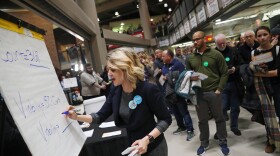It's unclear who officially won the Democratic caucuses Monday. Many caucusgoers were left with more questions than answers as the Iowa Democratic Party precincts struggled to report results.
River to River host Ben Kieffer, who anchored IPR's live caucus coverage on Monday night, spoke with Dennis Goldford, political science professor at Drake University, and Karen Kedrowski, director of the Carrie Chapman Catt Center for Women and Politics at Iowa State University.
Here were their answers to some of the questions we're asking today.
What should we make of the caucus chaos?
“Don’t ascribe to the conspiracy theories that are swirling around. I actually saw a headline on Fox News that connected Hillary Clinton to the people who programmed the app as if she was somehow responsible for what happened last night. I think this points to the weakness of the Democratic Party in Iowa, and probably political parties in the United States in general. You have a relatively small, underfunded party in a relatively small state,” Kedrowski said.
“They have to raise all of their own money, and they have to purchase the expertise. And they have to train lots of volunteers in what is a fairly complex process. And I really think that, probably just as a financial decision, they did not pay for adequate testing of this app," she continued.
Will Iowa retain its first-in-the nation status?
“I think it really does call into question whether Iowa can retain its first-in-the nation status. The eyes of the world are on Iowa, and this is absolutely humiliating," Kedrowski said.
“You have the collision, I think, of 21st century technology with what are essentially 19th century procedures. The caucuses just weren’t built to support the weight that’s put on them politically, and then you add in the technology aspect with the need for all these volunteers… to work a fairly complex set of steps to finish the process," Goldford said.

Did the Iowa Democratic Party do a poor job communicating with caucusgoers, campaigns and the media?
“One of the basic rules of crisis communication is to get out in front of the story to provide as much information as you possibly can, as quickly as you possibly can, and then provide some sort of a plan for moving forward....” Kedrowski said. “So the moment they knew that they had a problem, which was clearly before 1:00 in the morning, or when the testy conference calls happened with the candidates, or when they were hanging up on people and all of the other things. They should have come out and said, 'there is an issue, and we are being as careful as we can, and this is what we can tell you about what we know.'"
"If you talk about crisis management and crisis communication, I think that's in effect what the actual candidates did,” Goldford said. “Less so Biden, but certainly Buttigieg and Warren and Klobuchar and Sanders essentially gave victory speeches. In other words, they wanted to get out ahead of the results, whatever they might turn out to be to try to help shape that narrative."
All the candidates seemed to claim victory, despite the fact that there were no results. Who won?
What we saw last night, whether it's coin tosses last night, or four years ago or even with the difficulties last night is the indication at least to some extent that is its a very fragile, if not rickety machine, for doing all this. - Dennis Goldford
"Last night, for a certain number of hours at least, the attention of the world was focused on Iowa. And normally we disappear off the face of the earth the morning afterwards. But last night, the candidates, those who had exceeded expectations or at least met them, would have had the attention of certainly the country but also the world. Now it’s all muddied by the complications of the process and also by having to talk about this in terms of already being in New Hampshire," Goldford said.
Do the Iowa caucuses deserve the attention they get?
“What we saw last night, whether it’s coin tosses last night, or four years ago or even with the difficulties last night is the indication at least to some extent that it’s a very fragile, if not rickety machine, for doing all this,” Goldford said.
“...I think when you hear events like these... for the people for whom these various events have real world consequences, their argument will be this simply is unacceptable. And that would be their frustration and their anger.”







